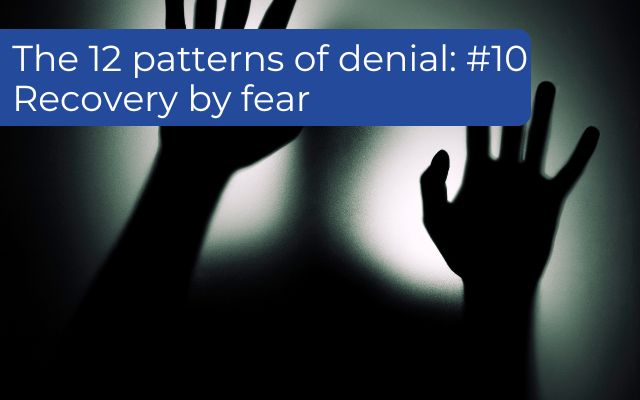
How Fear Shapes Denial in Addiction Recovery
Are you recognising how fear driven denial may be maintaining your addiction and preventing honest steps towards recovery?
In this blog we will look at recovery by fear in addiction recovery. People with addiction or substance abuse problems use different forms of denial to keep themselves in the addictive cycle. Denial can be a dysfunctional protection mechanism which you may use to protect yourself from having to recognise, deal with and accept the reality of what is occurring in your life. This is often unconscious.
To recover from addiction, it is incredibly important to be able to identify denial. The 12 patterns of denial were developed by international addiction expert Terence Gorski.
Recovery by fear is essentially the mistaken belief that fear on its own will keep a person addicted to drugs or alcohol clean. This denial pattern often kicks in after a particularly scary or traumatic event that occurs as a result of an individual’s addiction. For example, after a car accident while drunk. But, ultimately, those intense feelings of fear will fade, while the addiction will remain.
What is Denial in Addiction?
Denial is the first issue to address when addicted persons enter treatment or try other ways of recovering from their substance use disorder.
Denial is when someone
- Ignores reality
- Downplays reality
- Distorts reality
Reality is painful and difficult, and the addict turns to substances or other addictive behaviours to cope – i.e., to escape.
In the words of Dr Diamond: “The addict cannot tolerate reality… Neither internal reality nor external reality”. “They find reality repugnant, uncomfortable, and overwhelming, and prefer, like the psychotic, withdrawal into fantasy, bliss, or oblivion over reality.”
The first of the 12 steps of Alcoholics Anonymous, and other 12-step programmes, is completely geared at confronting and overcoming denial: We admitted that we were powerless over alcohol/drugs – that our lives had become unmanageable.
Without truly confronting and overcoming denial, no matter how much you want to get better, denial will trip you up and prevent you from recovering. This can be a tricky process because denial comes in so many forms and has become so normalised to the addict that they struggle to even recognise when they are using a given pattern of denial.

What is Recovery By Fear in Addiction Denial?
A certain level of fear in early recovery is normal as the pain of addiction is fresh in your mind. After they get clean and sober they might, for the first time, consciously connect with the fact that their life was in danger in active addiction. They may also realise that they put the life of someone they love in danger.
But some people believe that this fear is so powerful that, on its own, it can lead to recovery. In other words: A person can be ‘scared straight’.
This pattern of denial works by self-deception: The addict deceives themselves that they don’t have to change anything or do anything differently in order to stay sober. All they have to do is not pick up drugs or alcohol and they believe that fear, by itself, will help them accomplish this.
The problem is that fear has never been ‘enough’ to help someone stay clean and sober. Fear eventually fades and to ensure you stay clean and sober you need to follow a strong programme of recovery.
Fear and mistrust in relationships can have serious consequences for a person’s mental health and well-being. These emotions, whether they are the result of traumatic experiences in the past, attachment issues, or a history of toxic relationships, can shape our perceptions, behaviors, and overall quality of life. In this article, we will look at the impact of fear and mistrust in relationships on mental health, as well as the underlying causes and how individuals can heal and build healthier relationships.
Effects on Mental Health
Fear and mistrust in relationships can manifest in a variety of ways, negatively impacting mental health. Fear and mistrust can lead to increased anxiety, depression, low self-esteem, and difficulties forming or maintaining healthy relationships. These negative emotions can contribute to a cycle of self-destructive behaviors, isolation, and emotional distress, which can have a negative impact on one’s overall well-being.
Causes of Fear and Mistrust
Betrayal, abandonment, or abuse are common sources of fear and mistrust in relationships. Childhood traumas, dysfunctional family dynamics, or witnessing unhealthy relationships can all influence a person’s ability to trust and form secure attachments. These early experiences leave a person with deep-seated fears, distorted beliefs, and emotional wounds that affect one’s ability to trust others and oneself in intimate relationships.
Support for Families and Partners
Family involvement is associated with better engagement and steadier outcomes.
Remember: If nothing changes, then nothing changes.
In this blog we explain the recovery by fear pattern of denial and why fear alone can’t help a person with an addiction recover.
Are you in denial? Contact us and get help today.
Read more about the 12 patterns of denial below:
- Denial & Avoidance
- Absolute Denial
- Denial & Minimising
- Denial & Rationalising
- Denial & Blaming
- Denial & Comparing
- Denial & Compliance
- Denial & Manipulation
- Denial & Flight Into Health
- Denial & Strategic Hopelessness
- The Democratic Disease State
Recovery by fear can hide denial and keep people trapped in addiction recovery, prompting urgent honest steps towards healing and lasting change today.. Changes team counsellors are here to help you.Recovery By Fear Can Mask Denial And Block Healing








